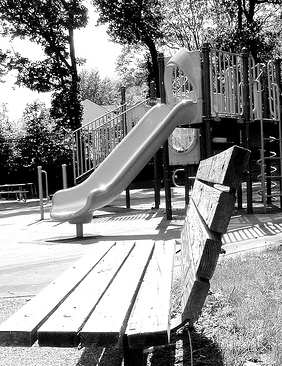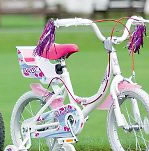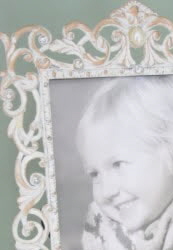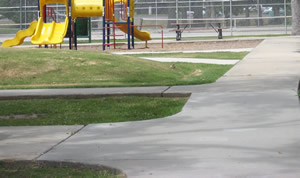|
|
|
The paved path sloped away from the park’s play area, and momentarily passed from the view of the adults sitting on benches there. The little girl moved faster as she approached the old lady. Agnes Bowers moved slowly, supported by her dull metal cane, with its large rubber end for gripping. Agnes saw that the shiny pink bicycle was new, and appeared to be too large for the child. Parents nowadays are always trying to get children to grow up before they’re ready, she thought. This was unfortunate. Just as the girl’s sunny, proud face arrived at her right, Agnes quickly thrust the tip of her metal cane on the spot of pavement between a training wheel and the rear tire of the bike. The bicycle came to a violent stop, and the child was tossed over the handlebars and onto the blacktop, landing on her head and neck, then rolling onto the grass beyond. As she lay there, screaming pitifully, Agnes turned to see what must have been the little girl’s mother sprinting over the rise. When the woman drew close enough to hear, Agnes said, “Poor thing fell off her bicycle. Guess she’s a bit young yet.” The little girl’s mother fell to the ground, and picking up the scraped and sobbing child, soothed her with kisses and kind words. As the din faded behind her, Agnes smiled. Cheaters never prosper. The world is an unfair place, Agnes thought. If you want to survive, you can’t cut corners. The quicker children learn the truth, the better off they’ll be, and the tougher they’ll be. Agnes was tough. Tough enough to survive in such an unkind and unfeeling world as this. Tough enough to survive those first few horrible years after her little girl had died of tuberculosis. Suddenly she saw her child’s face before her, the sunny, bright light of youth, extinguished forever. The singular joy in her life, gone. That was over forty years ago, though, and Agnes had long since buried her emotions, just as she had buried her daughter. If I hadn’t been tough, Agnes thought, I never would have kept my sanity. Friends had asked her to see the doctor. They told her that he would give her pills, medicine to ease the pain. Pills are for the weak and the mentally infirm, Agnes told them. That which does not kill me makes me stronger. I am stronger now, she thought. Others would have used such an incident as an excuse to become dependent on pills. She’d seen women like that, women who needed something to get them through their day. Some times it was alcohol, sometimes it was cigarettes, sometimes it was something stronger, but for these women, these weak women, there was always a crutch. There was always some enduring sign that they weren’t strong enough to make it on their own. Agnes had always assumed that her husband believed that when he left her a few years after the girl’s death. He must have believed that she was weak, that she couldn’t make it without him. He was wrong, of course. Agnes had made it just fine without him, or anybody else for that matter. People in one’s life could become a crutch too, a place of vulnerability. The only crutch Agnes Bowers had ever allowed herself was gripped tightly in her right hand as she slowly climbed the brick steps of her small Cape Cod, carefully unlocking, from top to bottom, the three dead bolts that secured the door. Closing it behind her, she sealed herself up in the comforting void of darkness therein. Moving across the sparsely furnished room, Agnes fell back into her lounge chair slowly, deliberately, in complete control of her leg and back muscles, releasing them into the softness of the padding at precisely the right moment. Her latest foray into the insecurity of the outside world complete, Agnes allowed herself to relax and soon she was asleep. For many days after that, Agnes would return to the park, occupying her usual spot on the bench near the swings, and she would watch the little girl. She saw as she struggled to regain her confidence, gingerly peddling her new bicycle along the path, slowly at first, then, as days became weeks, faster, and with more authority. Time passed, and as the scabs faded from the little girl’s face and knees, Agnes began to look at the child in a new way. This girl, she mused, is tough. She took the fall and got back up on the horse, so to speak. The child was rarely heard to whine or to complain, even when the older children were intentionally cruel to her. She just went about her business, carrying on as best she could. Soon, Agnes thought, the training wheels will come off, and the little girl will whiz fearlessly past her on the path, thinking nothing of what the old lady had done to her in the past. She probably doesn’t even know what I did, or doesn’t remember. Kids are like that. Upon closer study of the girl’s features, Agnes could now see a distinct resemblance to that of her daughter. The bright, piercing blue eyes, the bouncing amber hair, and of course, the look of absolute determination that was constantly about her. Agnes considered the possibility that her daughter and this little girl would have had much in common. Once again Agnes was startled to see the smiling face of her daughter before her. This time, she did not resist it, did not push it from her consciousness, but rather let it dangle there for a long moment. She allowed herself to travel back to happier times, when they were all together, the happy family, and everything was going to be wonderful forever. There was a time in her life when the world was open before her, a time before everything was to be taken away, piece by piece, hope by hope, dream by dream. Agnes could distinctly remember a time just before her life was shattered. She was not so tough then, only happy. Mr. and Mrs. Bowers were very much in love, and Agnes suspected that her friends secretly envied her life. If that had been someone else’s life, I would have envied it, too, she thought. But then the girl had been taken from her, and Agnes was unprepared for the malevolent rush of emotions that surged through her. She wasn’t ready for the emptiness, the depression, and the rages. Once it became clear that remembering her beautiful little girl did nothing more than to turn her into a basket case, Agnes Bowers determined to stop doing it. Presently her emotions came more under her control, but there was a price to be paid. Agnes found that by turning off such a large part of her heart, she had closed the doors on other things as well. She could not look in her little girl’s room without the feelings returning, so she pretended that the room no longer existed. Her relationship with Mr. Bowers became increasingly vague and distant. Sometimes it hurt just to look at him, because he reminded her of the love they had once shared, the love that produced the thing she had cherished the most, and the thing she that could never have again. It wasn’t long before she avoiding anything that might resurrect in her some traces of emotion, for fear that the rise of feeling might also provoke the rise of despair. This was about the time that those close to her began insisting that she get help, that she see a doctor. But Agnes, too proud to admit to any frailty, and too fragile to risk speaking about it, would hear none of it. And since those concerned refused to end the talk of doctors, Agnes soon would hear none of them, either. Eventually, Agnes’ contact with the outside world consisted of receiving obligatory holiday telephone calls and Christmas cards from people whose faces she could no longer remember. Through all of this, the old woman built up layers of callused skin around her heart, and she came to equate all emotion with pain, and by association, with weakness. Agnes would never be caught off guard again and she would certainly never allow herself to be hurt again. When Agnes came home that evening, she deviated from her typical pattern. On this night, lights that had gone unused for years were lit, and the old lady could smell the dust burning on the bulbs. It had never occurred to her to dust the tops of her light bulbs before, and now she decided that it would be hereafter unnecessary. After dinner, Agnes spent an hour in the attic, with no little difficulty, digging through the remnants of her former life, searching. Many times she stopped to gaze stupefied at some small scrap of clothing, some long forgotten plaything. Finally, at an hour by which time she would normally be asleep, she found them. The old photographs, the visual keepsakes of what she had once held near to her open heart, the people she once cared about more than life itself. Clutching them close to her breast, she carried them carefully down the steps and out to the living room, where she settled into her lounge chair to look at what she had lost, either by chance or by choice. And there she was, her beautiful little girl, smiling at the camera, waving from atop a pony, laughing at a party. For the first time in decades, Agnes Bowers cried. The next day was warm, but not unpleasantly so. The night before, Agnes had dreamt of her daughter, and she finally felt a sense of peace. In her usual place on the bench, she took notice of the children through new eyes now. Watching them play, she tried to get a fix on each of their personalities, and speculated on what kind of life they would lead as adults. She painted a scene with a policeman, a CEO, an athlete of some kind (Agnes wasn’t good with sports), and a baker who currently worked with pastries made from wet dirt. And then she was there, wobbling on to the stage from over the hill. The little girl was familiar on her bicycle, but on this day, the training wheels were gone. Her slender frame bounced from one side to the other as she struggled to maintain balance, but she never fell. As Agnes watched her pump the pedals and glide successfully from one place to the next, the old woman felt something very close to pride in the child’s achievement. I knew she could do it. She’s a tough little kid. As the afternoon progressed, the girl became more adept at riding, and soon the swaying and bouncing were gone. The old lady was tired now, and it was time to go home. As she moved away down the path, the very path where not so long ago Agnes had caused the girl to fall, Agnes wondered if in another time and another place, the little girl and her daughter could have been friends. On the path ahead Agnes saw a chunk of concrete sitting squarely in the middle of the path, and the old woman didn’t like it being there. The girl, she thought, just learning how to ride a two-wheeler, could be thrown by something like this. Very careless of someone. Nearing the obstruction, Agnes heard the familiar laughter behind her, and knew that the girl was on the path, coming her way. Quickening her steps Agnes got to the piece of block and bent down to pick it up, being sure to keep to the edge of the path, so as not to become an obstacle herself. Bending down to the ground took longer than the old woman expected, and she began to worry that she would not be able to remove it in time. Forcing herself all the way down with great effort, Agnes snatched the piece up in her hand just as the whirring of the little girl’s spokes caught up with her.
The force hit Agnes suddenly in the ribcage, and being in such a vulnerable position, she had no time to react. Striking the ground hard on her right side, the old woman screamed out in pain, gazing up at the back of the little girl, speeding away on her two-wheeler. The little girl did not look back at Agnes Bowers. Mean old lady. But now we’re even. |



 Seeing the old lady bent over to the side of the path, the little girl knew that she would have to drift somewhat left to avoid her, but there was plenty of room. As she closed the gap between them, she peddled harder, gaining velocity as she went, and then as she came upon the old woman, the little girl stuck her right hand out and gave the hunched figure a stiff arm in the back.
Seeing the old lady bent over to the side of the path, the little girl knew that she would have to drift somewhat left to avoid her, but there was plenty of room. As she closed the gap between them, she peddled harder, gaining velocity as she went, and then as she came upon the old woman, the little girl stuck her right hand out and gave the hunched figure a stiff arm in the back.